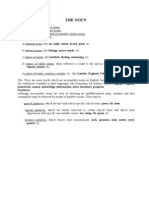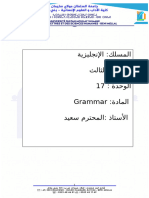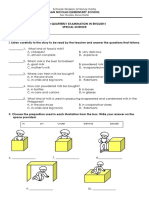The Articles
The Articles
Uploaded by
Marwan Sami Ahmad MohsenCopyright:
Available Formats
The Articles
The Articles
Uploaded by
Marwan Sami Ahmad MohsenOriginal Description:
Copyright
Available Formats
Share this document
Did you find this document useful?
Is this content inappropriate?
Copyright:
Available Formats
The Articles
The Articles
Uploaded by
Marwan Sami Ahmad MohsenCopyright:
Available Formats
The articles
What is an article? It is a word used to modify nouns. Types of articles:
1- Definite article (the). 2- Indefinite article (a/an). (a) = With consonant sounds, (e.g. A university, a table, a car). (an) = With vowel sounds, (e.g. An apple, an orange, an umbrella) 3- Zero article (x). The pronunciation of (The):
1- //: If it followed by consonant sounds, (e.g. The boy). 2- / /: If it followed by vowel sounds, (e.g. The others). 3- /i/: To emphasize, (e.g. A: Where is the book? B: Which book? A: the book.).
The uses of definite, indefinite, and zero articles:
A- The definite article (The): 1- Before the noun that is specific (Relative pronouns). e.g. (I met the man who called me.) 2- With the meaning of (The only one). e.g. (The sun, the moon, the earth) 3- Before names of countries begin with (UNITED). e.g. (The United Kingdom, the United State of America, the United Arab Emirates) 4- Before the groups of islands. e.g. (The Bahamas) 5- Before the names of rivers, seas, and oceans. e.g. (The Nile, the pacific)
6- Before chains of mountains and deserts. e.g. (The Alps) 7- Before names of (Hotels, shops, institutions, ect.), if these names are impersonal. e.g. (The army store, the housing bank) 8- Before the musical instruments. (To express the process of using instruments) e.g. (I bought a piano but I play the piano) 9- Before superlative degree. e.g. (The best, the most beautiful, the cleanest, etc.) 10- Before adjectives that are used as nouns. e.g. (A: The rich = rich people, B: The poor = poor people) 11- Before nouns that are mentioned for the second time. e.g. (I bought a car. The car is gray.) 12- before compound nouns. e.g. (The garden gate, the British council, and the Independence Day) 13- Before directions but if they are nouns and not an adverb. e.g. (A: I'm going to the north of Jordan B: They moved X north) B- Indefinite article (a/an): 1- Before the meaning of (One, any). e.g. (A: I bought a car, B: He ate an apple) 2- In certain expressions of measurement, price, speed, and quantity (A day, a week, a kilo, an hour). e.g. (A: Mona goes to school five days a week, B: Salaam paid seven J.D. a kilo. ) 3- Before certain words like (Couple, lot of, little, few, dozen, hundred, thousand, and million) e.g. (She has a dozen of pencils.)
4- With the meaning (Same) e.g. (Birds of a feather flock together.) 5- Before the singular nouns that are mentioned for the first time. e.g. ( I bought a car. The car is gray.) 6- With the complement of the sentence whether it is a job or an adjective. e.g. (A: My father is a teacher. B: She is a lovely girl.) 7- with exclamation sentences. e.g. (What a hot day!) C- Zero article (X) or general sense: 1- Before abstract nouns in a general sense like ( Life, death, fear, beauty, happiness, hope). e.g. (If there is no life, there is no death.) 2- Before gerund. e.g. (A: Reading is my hoppy, B: Walking is good for you.) 3- Before nouns of materials used in a general sense. e.g. (A: Eggs come from chicken, B: I like milk.) 4- Before plural nouns in a general sense. e.g. (Books are my friends.) 5- Before the names of meals in a general sense. e.g. (A: I had lunch with my family, B: Dinner is ready.) 6- Before titles followed by proper nouns. e.g. (King Abd Allah visits our city soon.) 7- Before names of languages. e.g. (English, Arabic, etc.) 8- Before names of people.
e.g. (Ahmad is a hard worker.) 9- Before names of seasons in a general sense. e.g. (Winter, spring, summer, and autumn (fall).) 10- Before institutions that we deal with. e.g. (A1: I went to school. (To learn) A2: I went to the school. (To visit) B1: He is going to church/ mosque. (To pray) B2: He is going to the church/ mosque. (Not to pay)) 11- With countries, states, counties or provinces, lakes and mountains except when they are mentioned as collection of states or chain of mountains or group of islands e.g. (The United States) e.g. (He lives in Washington near Mount Rainier.) e.g. (They live in northern British Columbia.)
You might also like
- Assignment 2 Language Related TasksDocument4 pagesAssignment 2 Language Related Tasksvlad tepish100% (11)
- THAI Grammar PDFDocument17 pagesTHAI Grammar PDFShirl100% (3)
- So... That... & Such... That... + Exercises With Suggested AnswersDocument3 pagesSo... That... & Such... That... + Exercises With Suggested AnswersFikret Erdeniz80% (5)
- Part D Assessments and or Data Collection Procedures 2Document9 pagesPart D Assessments and or Data Collection Procedures 2api-253451493100% (1)
- Articles: The Is Called The Definite Article, Because It Normally Points Out Some ParticularDocument7 pagesArticles: The Is Called The Definite Article, Because It Normally Points Out Some ParticularNarendra Babu KattaNo ratings yet
- The Use of ArticlesDocument19 pagesThe Use of Articlesavril55No ratings yet
- PDF ArticlesDocument16 pagesPDF ArticlesManish AgarwalNo ratings yet
- Articles 1st ChapterDocument12 pagesArticles 1st ChaptercharlesirudhaNo ratings yet
- Grammar Chapter-1 ArticlesDocument7 pagesGrammar Chapter-1 ArticlesSatyam SinghNo ratings yet
- Article 1st ChapterDocument10 pagesArticle 1st Chapterarun sngNo ratings yet
- Enjoy ItDocument11 pagesEnjoy ItAbdul Rahman AlhufashiNo ratings yet
- Summary of Unit 2-StructuresDocument3 pagesSummary of Unit 2-StructuresPenta Olivia RayendraNo ratings yet
- Comparison of English and Macedonian ArticlesDocument5 pagesComparison of English and Macedonian ArticlesBelinda M. VelkovaNo ratings yet
- ArticlesDocument4 pagesArticlesTâm EdgiNo ratings yet
- m12 Articles (A, An, The, Zero Article)Document11 pagesm12 Articles (A, An, The, Zero Article)3MA20Reynaldi Satria NNo ratings yet
- ArticlesDocument7 pagesArticlesShiv Kant TiwariNo ratings yet
- ArticlesDocument24 pagesArticlesLan NguyenNo ratings yet
- Spoken English MaterialDocument85 pagesSpoken English Materialramesh100% (1)
- ArticlesDocument32 pagesArticlesChandruNo ratings yet
- Use of Article: What Is An Article? Basically, An Article Is An Adjective. Like Adjectives, Articles Modify NounsDocument8 pagesUse of Article: What Is An Article? Basically, An Article Is An Adjective. Like Adjectives, Articles Modify NounsAbhimanyu SinghNo ratings yet
- Titularizare EnglezaDocument62 pagesTitularizare EnglezaAlexandra Candrea100% (1)
- Unit 1. The First Unit of The Section "Nouns" Is Called "Semantic Classes of Nouns"Document5 pagesUnit 1. The First Unit of The Section "Nouns" Is Called "Semantic Classes of Nouns"Женя РовдоNo ratings yet
- ArticlesDocument7 pagesArticlesMohan ParasethNo ratings yet
- Determiners - by Sahed Laskar..Document6 pagesDeterminers - by Sahed Laskar..Abdulla AhmedNo ratings yet
- ArticlesDocument12 pagesArticlesRobert SkorkaNo ratings yet
- ArticlesDocument2 pagesArticlesЮлія ЖитарNo ratings yet
- LMD 1 Articles LectureDocument6 pagesLMD 1 Articles Lecturefarahmoussi1No ratings yet
- Articles 1Document8 pagesArticles 1raghvendra singhNo ratings yet
- ArticlesDocument9 pagesArticlesDragana AleksicNo ratings yet
- Article DistinguishDocument2 pagesArticle DistinguishChâu HoàngNo ratings yet
- Week 7Document6 pagesWeek 7Muhammad FarazNo ratings yet
- StudentDocument4 pagesStudentjanmohammadrahimi439No ratings yet
- Baeat GrammarDocument4 pagesBaeat Grammarjanmohammadrahimi439No ratings yet
- TeacherDocument4 pagesTeacherjanmohammadrahimi439No ratings yet
- Spicial GrammarDocument4 pagesSpicial Grammarjanmohammadrahimi439No ratings yet
- Easiy EnglishDocument4 pagesEasiy Englishjanmohammadrahimi439No ratings yet
- Pre-Starter GrammarDocument4 pagesPre-Starter Grammarjanmohammadrahimi439No ratings yet
- Tom and JeryDocument4 pagesTom and Jeryjanmohammadrahimi439No ratings yet
- A/ The Indefinite Article A:: Teacher and His Wife Is An ArchitectDocument3 pagesA/ The Indefinite Article A:: Teacher and His Wife Is An ArchitectletranaivangtinhNo ratings yet
- Definite 'The'.: A and An Are Used Before Nouns That Introduce Something orDocument4 pagesDefinite 'The'.: A and An Are Used Before Nouns That Introduce Something orasmawiNo ratings yet
- Articles The - An A - Non ArticleDocument3 pagesArticles The - An A - Non ArticleDaniel Silva NievesNo ratings yet
- For Example An ADocument4 pagesFor Example An AAkari Etsuko Herrera PobleteNo ratings yet
- Grade 7 - ArticlesDocument8 pagesGrade 7 - Articlesbhavika gyanchandaniNo ratings yet
- General Rules:: Indefinite and Definite Articles Page 1Document9 pagesGeneral Rules:: Indefinite and Definite Articles Page 1Ariol ZereNo ratings yet
- Grammar Reference Articles Aandan A or An Means One Person or Thing. We Use A or AnDocument4 pagesGrammar Reference Articles Aandan A or An Means One Person or Thing. We Use A or AnСофья ВасильеваNo ratings yet
- Unit 3 ArticleDocument4 pagesUnit 3 ArticleDr. KafleNo ratings yet
- Open University of Sudan: in The Name of Allah Most Gracious Most MercifulDocument13 pagesOpen University of Sudan: in The Name of Allah Most Gracious Most MercifulBaskal AhmedNo ratings yet
- Articles A An TheDocument14 pagesArticles A An TheSilvia Alejandra SuarezNo ratings yet
- English SyntaxDocument46 pagesEnglish SyntaxJan Friderik GrantNo ratings yet
- GrammarDocument195 pagesGrammarAbdullah Alamri100% (1)
- The Noun: I. ClassificationsDocument11 pagesThe Noun: I. ClassificationsGrecu GabrielaNo ratings yet
- English Grammar LjlahflaheljtlejlDocument13 pagesEnglish Grammar LjlahflaheljtlejlGeo Oprea100% (1)
- The Indefinite Article (A /an)Document4 pagesThe Indefinite Article (A /an)Luis Carlos Pimentel VignesNo ratings yet
- ArticlesDocument1 pageArticleskumaar1980No ratings yet
- The Articles: A, An, The The A AnDocument10 pagesThe Articles: A, An, The The A AnDeepa Ramiah Deepa RamiahNo ratings yet
- 1-2 - M17 - Grammar3, S3 Weeks 1+2, Pr. ElmouhtarimDocument17 pages1-2 - M17 - Grammar3, S3 Weeks 1+2, Pr. ElmouhtarimSimo SimoNo ratings yet
- ARTICLESDocument15 pagesARTICLESnikola90bbNo ratings yet
- English Has Two Articles: .: Some Important Grammar Rules ArticlesDocument6 pagesEnglish Has Two Articles: .: Some Important Grammar Rules ArticlesUma Kalyani0% (1)
- A, AnDocument9 pagesA, AnRutNo ratings yet
- Artice (Part-1)Document6 pagesArtice (Part-1)Dileep DileepNo ratings yet
- 02 DeterminersDocument17 pages02 DeterminersAdina IacobNo ratings yet
- Determiners: GrammarDocument13 pagesDeterminers: GrammarPratishtha MishraNo ratings yet
- Present Perfect ExercisesDocument3 pagesPresent Perfect Exercisescr_cristinaNo ratings yet
- San Nicolas, Ilocos Norte: in On Under Behind BesideDocument3 pagesSan Nicolas, Ilocos Norte: in On Under Behind Besidesir jjNo ratings yet
- Articles and Interrogatives AdvDocument28 pagesArticles and Interrogatives AdvAsheeeNo ratings yet
- Binding TheoryDocument4 pagesBinding TheoryMaruf Alam Munna100% (1)
- Verb To Be NotesDocument2 pagesVerb To Be NotesElly AlphonsusNo ratings yet
- Personal Pronouns, Possessive Adjectives, Possessive Pronouns, Reflexive Pronouns, Object PronounsDocument19 pagesPersonal Pronouns, Possessive Adjectives, Possessive Pronouns, Reflexive Pronouns, Object PronounsAlice CantemirNo ratings yet
- Miggy's Lang RevDocument6 pagesMiggy's Lang RevSherryl Lyn Pulido EcobisagNo ratings yet
- What Is A NounDocument22 pagesWhat Is A NounSylvia GintingNo ratings yet
- CAE Gold Plus - DochyuDocument15 pagesCAE Gold Plus - DochyuSimona SymonyciNo ratings yet
- Chapter 3 - Gender, Number and TypeDocument6 pagesChapter 3 - Gender, Number and TypeMahdi HasanNo ratings yet
- Active and Passive VoiceDocument4 pagesActive and Passive Voicefrankramirez9663381No ratings yet
- Spoken Hindi Chapter Book PDFDocument131 pagesSpoken Hindi Chapter Book PDFSHAHIL RAAZNo ratings yet
- Topics To Be Covered For UpsrDocument4 pagesTopics To Be Covered For UpsrZahariah HusinNo ratings yet
- Review of CebuanoDocument20 pagesReview of CebuanoAlex MingNo ratings yet
- Leson 1.2 Possessives: Possessive Determiners ExampleDocument5 pagesLeson 1.2 Possessives: Possessive Determiners ExampleJuan David AntolinezNo ratings yet
- IELTS Writing Task 1 Tips (P3)Document27 pagesIELTS Writing Task 1 Tips (P3)Anh Ngữ Giao TiếpNo ratings yet
- Analitical Greek New TestamentDocument48 pagesAnalitical Greek New TestamentPeia Ana-Maria67% (3)
- Vietnamese Lesson For Foreigners 7ppDocument7 pagesVietnamese Lesson For Foreigners 7pphellojaimeNo ratings yet
- 28) Introductory Lessons in AramaicDocument134 pages28) Introductory Lessons in AramaicTheTexasRAT100% (1)
- AdjectivesDocument16 pagesAdjectivestheoNo ratings yet
- Roll A Sentence PDFDocument0 pagesRoll A Sentence PDFlucianabianchiniNo ratings yet
- ConjunctionDocument3 pagesConjunctionChristopher FitzgeraldNo ratings yet
- A, An, The, This, That, Those EJERCICIOSDocument6 pagesA, An, The, This, That, Those EJERCICIOSSamir JurubebaNo ratings yet
- 5050 PDFDocument251 pages5050 PDFSaiful LahidjunNo ratings yet
- Fundamentals A 2nd PartialDocument8 pagesFundamentals A 2nd PartialNIKITA_CORINNENo ratings yet
- Coordinating Conjunctions and Their FunctionsDocument4 pagesCoordinating Conjunctions and Their Functionsapi-263973348100% (1)

























































































